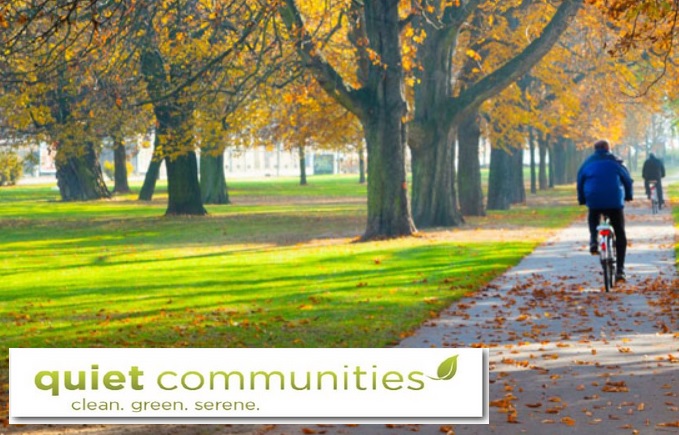Quiet Communities is a nonprofit organization that takes an evidence-based approach to help communities understand the adverse effects of gas powered outdoor maintenance and find quiet, sustainable, and healthy solutions.
Noise from landscape equipment is not simply a nuisance, it is a health hazard causing conditions ranging from annoyance and sleep disruption to cardiovascular disease and hearing loss as well as hyperacusis. It affects not only our physical health and mental health, but also our ability to think and function. Results of studies show that noise exposure is responsible for health problems in tens of millions of Americans at a cost running in the billions of dollars each year (Hammer, 2014; Swinburn, 2015).
 Landscape maintenance equipment – mowers, blowers, edgers, trimmers, brush cutters – produce 90-115 decibels at point of use. Quiet Communities is working to influence changes to the landscape industry and give hyperacusis sufferers options for influencing change at a local level for these destructive sources of noise.
Landscape maintenance equipment – mowers, blowers, edgers, trimmers, brush cutters – produce 90-115 decibels at point of use. Quiet Communities is working to influence changes to the landscape industry and give hyperacusis sufferers options for influencing change at a local level for these destructive sources of noise.
Hyperacusis Research recently met with several members of the Quiet Communities team: David Sykes, Strategic Advisor, Jamie Banks, Executive Director, and Jeanne Kempthorne who are pictured with Bryan Pollard.
Also check out the article from Hearing Health titled “Turn Down the Noise, Turn Up the Quiet.”


While I feel there are a range of products that adversely impact the community sound environment it is good to at least read that someone is trying to do something about noise. In 1980 I went to the E.P.A. offices in Washington and was told that noise pollution was a problem even in states like Maine and the problem would get worse if nothing was done. Something was done.Reagon did away with the Noise Abatement Devision. It si good to know someone is at least trying to address the problem and do something about it. Thank you
It seems like with everyone having surround sound, sound bars and speakers with sub-woofer, leads to everyone else having something louder. I hate hearing my neighbors TV so loud I can tell what the content and dialog is and they yell and bang cabinets and have no idea no one wants to hear their fights and stupid shows. Show some common courteous to your neighbors and keep you volume down or get head phones, because ear plugs and head phones cannot keep out the sound your noise and vibration creates.
I suffer from hyperacusis. Due to financial reasons and few housing options in my rural county, I have been a resident in two different apartment complexes over the last 15 years. My first complex was built in the 1970s, and my current complex completed construction this year (2019). Despite the 40+ year difference between when these complexes were built, they both suffer the same symptom: unless I lived in a corner unit on the highest floor, the most normal everyday noises from surrounding neighbors will always invade what is supposed to be the sanctuary of my home. This isn’t necessarily caused by rude, noisy neighbors, but more so due to construction standards. I do not understand how an average affordable apartment building can be built just like a multi-storied single family home. So much noise is carried through wood and drywall, which isn’t too much of an issue for a home containing one family. But what about the same type of construction housing many separate households? Why are tiered apartments not built like hotels – out of concrete – to dampen or eliminate the sounds between units? I go on vacation to stay in a relatively noise-free hotel room but come home to live in a building that was built no differently than the vinyl-sided two-story house down the street, only I share it with 11 other households! I’m in need of a quiet home for my sanity and ability to function. Until I can afford a single-family home on its own plot of land (which is impossible these days for a single, unmarried individual who lives alone), I will suffer every single day with uncontrollable noise outside, and inside, my home. I hope construction standards will one day change and improve so everyone can have the opportunity to live in a quiet, peaceful home…not just the ones who can afford it.
I thought things would be better in a single family home than in my condo. Nope. Instead of blowers once a week for two neighboring condo complexes (=2hours/week), now every house has their gardener come by (=15mins x ad nauseum). We got barking dogs to the left, the right, down the back, and up the middle. Then there’s the boomer cars, the mega mufflers, the donut-screechers, and your occasional tweaker or drink out on the boulevard behind the house. I swear, something’s gotta be done. There are lots of people with sensory issues and loud noise is not a simple inconvenience for them, nor for regular people if it is routine. Land of the free. Sheer hell for some. It has to change.